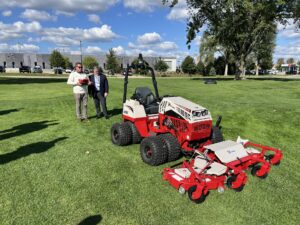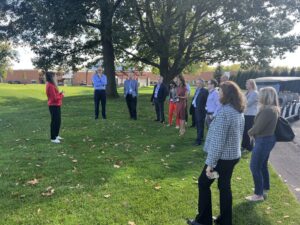Our recent HQExperience visit to The Toro Company in Bloomington on Wednesday, September 24, 2025, delivered exactly what we hoped to achieve: transforming abstract policy debates into concrete understanding of economic impact.
Representative Jeff Witte captured this perfectly when he said, “Serving on the tax committee it was nice to see the impact of the R&D credit right here. We hear a lot of different opinions on the R&D tax, but to be able to come and see first-hand what it was going to was really incredible.” This is why these visits matter – legislators can move beyond theoretical discussions to witness real-world policy outcomes.
At Toro, those outcomes are impressive. The company has invested on average of over $150 million annually over the last five years in research and development, with a significant percentage of that work happening right here in Minnesota. Legislators saw cutting-edge innovations like remote-controlled mowers that tackle challenging terrain and autonomous solutions that deliver precision results, all developed through R&D investments supported by smart tax policy.
The visit also highlighted both opportunities and challenges facing Minnesota manufacturers. Toro’s Windom plant represents a manufacturing success story, with roughly 120 open positions today and over 200 applications for jobs as the company transitions production to the facility to help offset the impacts of the challenging business climate. Yet tariffs cost the company approximately $45 million annually, demonstrating how trade policy directly impacts Minnesota employers’ competitiveness.
These facility demonstrations accomplish what traditional policy discussions cannot. When legislators see innovation labs in action, meet the engineers developing next-generation equipment, and understand how global operations are coordinated from Minnesota headquarters, policy connections become unmistakable. Tax credits aren’t just line items in legislation, they’re the foundation for innovation that keeps century-old Minnesota companies competitive worldwide.
Minnesota’s headquarters economy advantage depends on policy environments that support innovation, manufacturing competitiveness, and global operations coordination. The Toro visit showed legislators exactly how their decisions enable companies to invest in R&D, create jobs, and maintain their Minnesota roots while serving markets worldwide.

